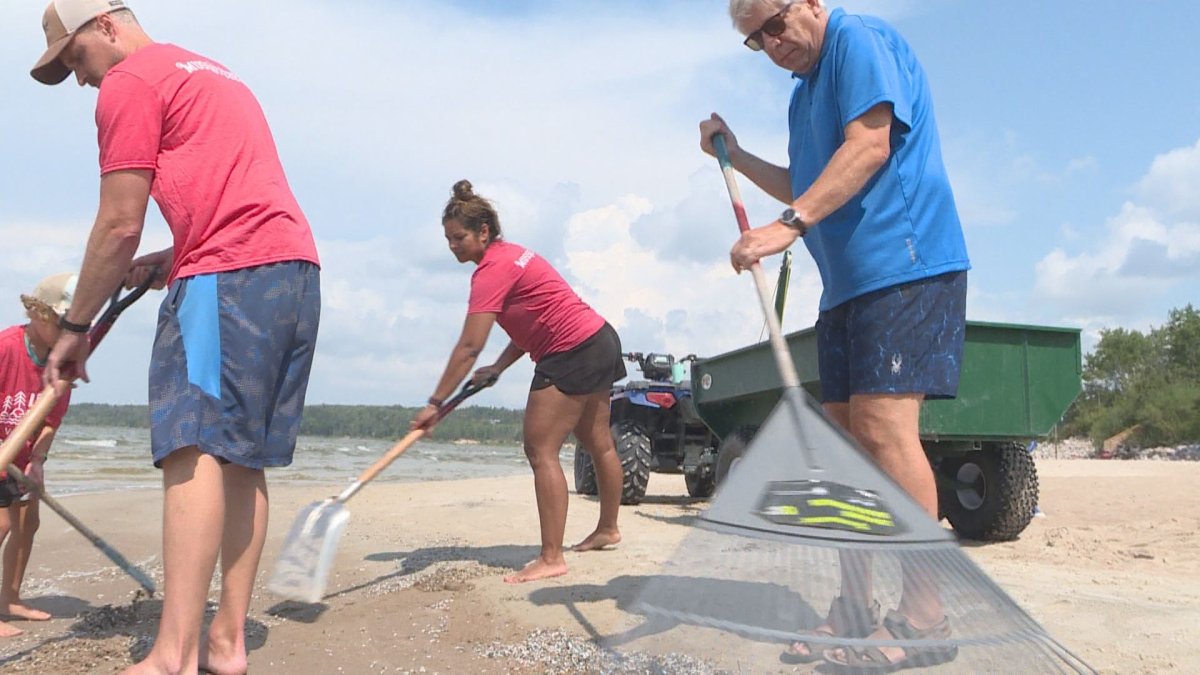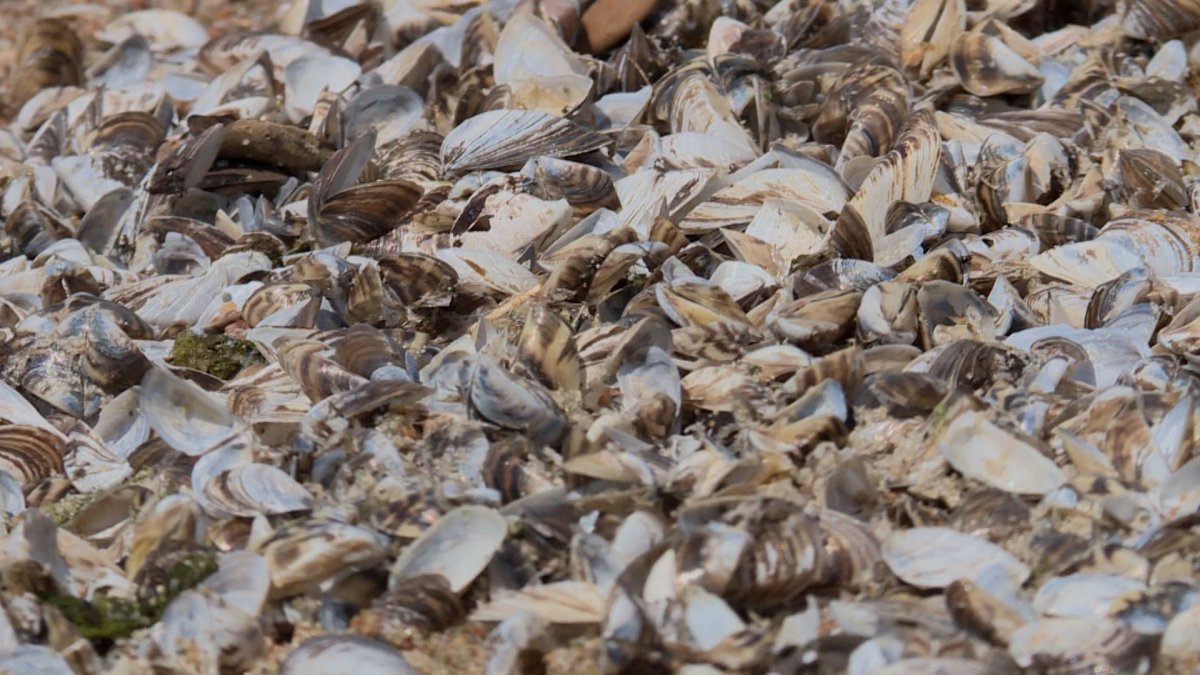A group of volunteers in Lester Beach, Man. have been putting in a bit of muscle power to tackle the zebra mussel problem in Lake Winnipeg.

The aquatic invasive species were first detected in Lake Winnipeg in 2013. Now, many beaches on the lake are littered with sharp, unsightly, foul-smelling shells from the mussels, something that prompted Nicole Lester to take matters into her own hands about five years ago.
“We were just sitting on the beach and the mussels were starting to come (in),” Lester told Global News.
“And at the time my son was just crawling around and we were worried about how sharp they were, and they looked gross and they kind of smelled bad. And we said, ‘Man, what if someone on the beach just raked these up and cleaned them up, even for the weekend.’ And, as they say, if you want something done, do it yourself. So, we just started.”
Lester says they put posters up around the beach and posted about their efforts on social media. Now, a core group of dedicated volunteers meets on the beach every Saturday morning at 8:30 a.m. to rake, shovel, load, and haul the zebra mussels shells, as well as garbage and others items that wash ashore, including the recent mayfly hatch.
Lester’s five-year-old son, Weston, even takes part in the cleanup efforts.
“We clean up zebra mussels and sticks and garbage we find on the beach,” said young Weston. “You can help other people by not getting them hurt.”
Lester says they also leave rakes at the beach if beachgoers want to pitch in outside of the usual Saturday morning cleanup. She says the work the volunteers do does make a big impact, keeping Lester Beach in more pristine shape than other beaches on Lake Winnipeg that aren’t regularly cleaned of zebra mussels.
“I grew up on this beach, I ran around here as a toddler, and I want that for my son. I want him to grow up loving this place and have a safe place to be,” Lester said.
“And we do make a difference in what we do. We’ve seen over the years, especially as the summer goes on, when you stay on top of (the zebra mussels), it does help keep the beach clean. Less and less wash up in our bay on our shore.”
Lester says on particularly bad days, they haul away nine to ten loads of zebra mussels shells.
“Every week it depends on the direction of the wind, the waves (for) how much it brings in,” she said. “But at the beginning of the year we find there’s a lot more in the bay (and) by the end of the beach season, because we’ve kept on top of it, we have less and less that wash out continually every week, so it helps.”
“In past years, there have been some weekends that it’s just so disgusting,” Lester Beach Association president Gordon Campbell said. “But with the volunteers, they make it a really beautiful spot for everybody. Without the volunteers doing it, I think our beach would be a very unpleasant place for people and kids.”
Province monitoring for zebra mussels, other aquatic invasive species
The province says zebra mussels haven’t been detected in any new bodies of water. But they’re continuing to multiply rapidly in the lakes and rivers where they currently exist.
“Considering we have over 100,000 bodies of water, there’s a lot worse that it could be, (but) obviously we don’t want them to be in any waterbodies,” said Kayla Peterniak, an aquatic invasive species ecologist with the province.
“They could have really negative impacts in any waterbody that they’re in and they’re in some pretty ecologically significant and larges waterbodies as well. It is quite concerning where they’re at, and once they get into a waterbody, the rate at which they expand and spread within those waterbodies (is concerning).”
So far, zebra mussels have been found in Lake Winnipeg, Lake Manitoba, the Manitoba portion of the Red River, Cedar Lake in northern Manitoba, and along the Nelson River system.
Peterniak says an adult female zebra mussel is able to produce up to one million eggs annually, allowing the species to multiply rapidly.
“They’re able to reproduce really, really quickly and one zebra mussel can filter a litre of water in a day – So it’s filtering all of those nutrients and organisms out of the water and not leaving those for our native species that need those to survive, so it can have a bottom up effect in the ecosystem and cause problems that way,” Peterniak said.
The province is also actively monitoring for other invasive species of concern, including the flying Asian carp, which have come as close as North Dakota, and the spiny waterflea, which has already been found in Manitoba.
“The native zooplankton — they eat a lot of those — and that’s something that’s consumed by small fish so then it’s not available for the small fish to eat,” Peterniak said.
“Also with their long, barbed tails they can be quite sharp. So, if a small fish ingests them, it can actually rupture the stomach or get caught in the throats of the small fish and then cause negative effects that way.”
Volunteers want to see more done to curb the spread of zebra mussels
Lester says their group of volunteers receives annual grants from the Rural Municipality of Alexander, which has helped them to purchase equipment necessary for cleanup efforts, including a quad and trailer. But she says they want to see more support from the province and more work being done to curb the spread of zebra mussels.
“It’s just disheartening because we knew they were coming, it was something that had been talked about a lot,” she said. “When they first arrived and started making a big impact on the beaches, we called when we wanted to start a clean up – We called the Province of Manitoba, I called and wrote (and) we never got any response.”
Campbell says he has concerns over how it could impact Lake Winnipeg’s tourism, as well.
“If we don’t maintain (the beach) by investing in it, how are we going to encourage tourists and even local people who want to use the beach. Why not put the funds in to keep it really nice?”
Lester says more can be done to curb the spread.
“I would have liked them to take some more actions at the beginning when they knew this was an issue,” she added. “There’s boat launches all around here and so I know they can’t have washing stations at every boat launch but there is no signage at them, there was nothing to really encourage or prevent people from transferring boats from one lake to the next. There isn’t washing stations really anywhere around here. Now that they’re here, it’s really hard to do anything about them.”








Comments